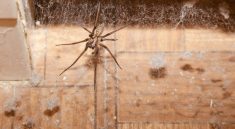Moisture, organic matter, and New Jersey’s temperate autumn weather ideally create an environment for breeding right at your doorstep. Procrastination over doing the weekend yard work can quickly blossom into the pest management nightmare that lingers well through winter. Alliance Pest Services recognizes these patterns as they change with the seasons. They are more than capable of helping to prevent minor leaf pile problems from turning into severe infestations that could interfere with your family’s comfort and safety.
Why Leaf Piles Attract More Than Just Autumn Vibes
-
Moisture Creates Perfect Breeding Conditions
The leaf piles naturally capture moisture from Metuchen, transporting its frequent autumn rain showers. This forms sweaty little microclimates that are irresistible to insects and small mammals for home and breeding.
-
Decomposing Organic Matter Provides Food Sources
When they break down, they release nutrients that attract a plethora of pests. Since these piles give off heat as they decompose, they’re especially appealing on a cool night.
-
Protection from Natural Predators
Thick leaf piles are an ideal hiding place for pests to escape birds, spiders, and other natural predators that would otherwise control their populations.
-
Temperature Regulation Benefits
Leaf piles are research-proven to be 10-15 degrees warmer than the ground, a much-needed boost of warmth for insects preparing to hibernate.
-
Easy Access to Your Home’s Foundation
Pests that overwinter in yard debris often migrate closer to your home’s foundation, looking for more shelter as Middlesex County winter temperatures continue to dip.
Common Pests That Thrive in Fall Leaf Piles
- Mice and voles – These little rodents access the foundation of your household and garden areas along paths that leave leaf piles
- Ticks – Overwinter in the leaf litter and can be active in mild winters in NJ, posing a health risk to families and pets
- Spiders – Different spider species, such as house spiders, build nests in a safe enclosure
- Ant – Many species use decomposing leaves as satellite nesting sites in proximity to their main colonies
- Beetles – Various species, including ground beetles that overwinter among leaf debris
- Slugs and snails – They take advantage of the damp atmosphere to eat and breed
Health and Property Risks Linked to Ignored Leaf Piles
- Build your immunity – Ticks hidden in leaf piles can bring you Lyme disease, and the annual cases in Middlesex County are over 200
- Allergic reactions – Mold spores, which originate from decaying leaves, cause respiratory problems and aggravate asthma
- Structural damage risk – Termites and carpenter ants will move from the leaf piles into wood deck supports and your home foundation
- Destruction of the landscape – Voles build tunnel systems that destroy the grass roots and garden plants across your land
- Pet health issues – contaminated leaf debris can transmit parasites, ticks, and irritate skin in dogs and cats
- Fire triggers – Build up of dead leaves, regional to residences, generation getting rid of material, welcoming fires
- Property value factor – A continuous pest infestation and trouble with your greenery can influence how marketable your residence is
Seasonal Pest Management for Metuchen Homeowners
Shortened intervals of leaf removal every two weeks during peak fall will mean fewer pests are attracted to your property. Concentrate on places 20 feet around your house and specifically look out spots around basement windows, crawl space vents, and exterior doors. If you are seeing more pest activity, then looking into professional inspection services would be a good idea.
With their fall prevention programs, Alliance Pest Services has assisted thousands of Metuchen families in dealing with seasonal pest challenges. They know the local pest tendencies and seasonal migration behaviors for the climate of central New Jersey. Middlesex County health statistics show that properties with professional seasonal pest control experience 60% fewer winter rodent complaints than those relying on DIY stores alone. They will be able to identify the weak spots of your property and suggest preventive measures before little problems develop into big ones that will require full-blown treatment.




